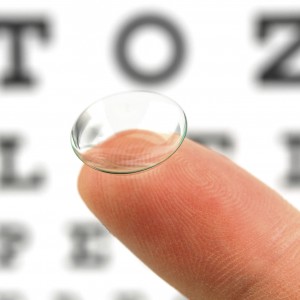 Two Main Types of Contact Lenses:
Two Main Types of Contact Lenses:
Contact lenses are tiny discs of plastic placed on the surface of the eye, as a substitute for wearing glasses. Contact lenses are made of different types of plastics, but they fall into two main categories:
- Soft contact lenses are gel-like and conform to the shape of your eye. They are very comfortable and are hardly noticeable once the lenses are placed on the eye. The replacement schedule ranges from daily to monthly disposable, and some are designed for extended wear overnight.
- Gas permeable (GP) contact lenses are more rigid and smaller in diameter. Compared to soft lenses, GP lenses are more durable, allow more oxygen to enter your eyes, and can correct certain vision problems. However, they may be less comfortable initially and take a longer time to get used to.
Advantages of Contact Lenses:
- They move with your eye, allowing a natural field of vision.
- There are no frames or reflections to block your view.
- They don’t fog up.
- They do not get in the way of your activities.
- You can wear sunglasses over them.
Disadvantages of Contact Lenses:
- They require more time for lens care than glasses.
- You have to clean and store them properly, comply with lens-wearing schedules, and make appointments for follow-up care.
- Improper use of contact lenses puts you at risk for several serious conditions, including eye irritations, infections, and corneal abrasions.
Can Anyone Wear Contact Lenses?
Most people who want to wear contact lenses can wear them, but contacts may not be a good option for people who:
- Have had repeated eye infections.
- Have severe allergies.
- Have dry eyes.
- Have a work environment that is dusty or dirty.
- Have eye conditions that prevent contact lens wear.
Are Contact Lenses Hard to Take Care Of?
It differs from lens to lens:
- Gas Permeable contacts, which last for years, need daily cleaning and disinfecting. Their slick surface resist deposit buildup, so enzyme cleaning is generally not necessary.
- Daily soft disposable lenses are for one-time wearing, with no maintenance required.
- Weekly to monthly soft disposable lenses are cleaned at the end of the day and then soaked in disinfecting solution until they are worn again.
Multipurpose or hydrogen peroxide solution is used to clean, disinfect, and remove protein deposits from most types of contact lenses.
Can I Sleep with Contact Lenses on?
It depends on the type of lenses you are wearing, your general eye health, and other factors. Most types of lenses are not designed for overnight wearing, and doing so could lead to serious eye problems. If you are in need of extended/overnight contact lenses, ask your doctor for his/her recommendation.
Follow These Recommendations by the American Optometric Association for Lens Care:
Dos:
- Always wash your hands before handling contact lenses.
- Clean the lenses regularly and carefully as directed.
- Store lenses in the proper lens case and replace the case at least once every 3 months. Use only fresh solution to clean and store contact lenses.
- Use only products recommended by your optometrist to clean and disinfect your lenses.
- Replace lenses as scheduled.
- Remove contact lenses before swimming or entering a hot tub.
- Visit your optometrist for routine eye exams.
Don’ts:
- Don’t sleep with contact lenses on as it increases your chance of irritation or infection.
- Don’t moisten contact lenses with saliva; it is full of bacteria.
- Don’t use tap water to wash or store contact lenses.
- Don’t transfer contact lens solutions into smaller travel size containers.
- Don’t use hand creams or lotions before handling contacts.
- Don’t share or swap lenses with others.
- Don’t purchase lenses from unauthorized vendors.
Symptoms of Eye Irritation or Infection:
If you experience any of the following, remove your lenses immediately and contact your eye care professional right away.
- Blurred or fuzzy vision, especially if it occurs suddenly
- Excess tearing or other discharge
- Itching, burning, or gritty feelings
- Unusual redness
- Unusual sensitivity to light
- Pain in and around the eyes


